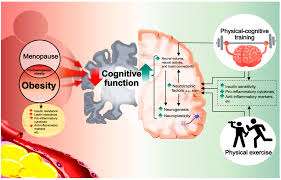Obesity’s effects extend well beyond waistlines; it is increasingly linked to mental health, specifically cognitive decline.
Studies suggest that carrying excess weight does not just impact our physical health but also our brain health.
So, how exactly does obesity accelerate cognitive decline?
In this article, leanandfit.info shall dive into the science and factors that explain this link, discuss how obesity affects brain structure, and offer some real-life insights into why maintaining a healthy weight is critical for cognitive health.
“How Obesity Accelerates Cognitive Decline” Article Index:
- The Link Between Obesity and Cognitive Decline
- How Obesity Affects Brain Structure and Function?
- The Role of Inflammation in Cognitive Decline
- Blood Flow and Metabolic Health in Cognitive Function
- Real-Life Examples and Studies on Obesity and Cognitive Impairment
- Conclusion: Steps to Protect Your Brain Health
The Link Between Obesity and Cognitive Decline
Studies increasingly highlight a strong association between obesity and cognitive decline, emphasizing the negative effects of excess weight on brain health. Obesity has been linked to a heightened risk of cognitive deterioration, dementia, and neurodegenerative diseases such as Alzheimer’s.
According to the Journal of Alzheimer’s Disease, obesity correlates with an increased risk of mild cognitive impairment, memory loss, and reduced attention span.
Several mechanisms contribute to this connection. Chronic inflammation, commonly found in obese individuals, is believed to negatively impact brain function. Inflammatory cytokines may cross the blood-brain barrier, affecting memory-related brain regions.
Additionally, obesity can lead to structural changes in the brain, such as atrophy in areas responsible for learning and memory. Disruptions in blood circulation due to obesity-related vascular issues further contribute to cognitive decline.
A study published in Practical Neurology also highlights that these vascular complications can accelerate brain aging.
Research published on the National Institutes of Health (NIH) website indicates that maintaining a healthy waist-to-hip ratio and following a high-quality diet in midlife significantly benefits cognitive function later in life.
A 21-year study of British civil servants found that individuals with better metabolic health during midlife had superior memory, executive function, and cognitive performance in their 70s.
Additionally, obesity appears to affect cognitive decline differently in men and women. A study reported in The Times found that memory loss due to obesity progresses faster in men between 55 and 74, whereas women experience the greatest decline between 65 and 74.
Visceral fat, which surrounds internal organs, has also been directly linked to increased dementia risk.
According to The Sun, higher levels of visceral fat are associated with elevated amyloid plaques and tau proteins in the brain—biomarkers of Alzheimer’s disease. Some studies suggest that visceral fat accumulation can predict Alzheimer’s risk up to two decades before symptoms appear.
Encouragingly, interventions to combat obesity can help mitigate cognitive decline. Research published on arXiv.org has shown that significant weight loss, such as through bariatric surgery, may help reverse obesity-related brain abnormalities.
The link between obesity and cognitive decline is complex, involving inflammation, brain structure changes, and vascular dysfunction.
However, maintaining a healthy weight through proper nutrition and physical activity can be crucial in preserving cognitive function and reducing the risk of dementia and Alzheimer’s disease.

How Obesity Affects Brain Structure and Function?
The physical and chemical changes obesity triggers in the brain are significant.
Research shows that obesity can cause structural changes in the brain, particularly in areas involved in memory, decision-making, and impulse control.
One study published in Nature Neuroscience found that obese individuals had lower gray matter volume, especially in regions related to cognition and executive functions.
Brain Atrophy
Brain atrophy, or the shrinking of brain cells, is more common in individuals with obesity.
This atrophy impacts the brain’s capacity to store and process information.
A study from Neurology highlighted how people with higher BMI were more likely to experience greater reductions in brain volume over time, impacting cognitive functions.
Decreased Neural Connectivity
Obesity also affects how brain cells communicate with each other.
Excess body fat is linked to lower levels of neural connectivity, which is essential for quick, clear thinking and effective decision-making.
This decline in neural efficiency can lead to difficulties in memory recall, focus, and problem-solving skills, which are some classic cognitive impairment examples seen in people struggling with obesity.
The Role of Inflammation in Cognitive Decline
One of the primary drivers of cognitive impairment associated with obesity is chronic inflammation.
Fat cells, especially those surrounding organs in the abdominal area, are not simply inert energy storage but actively produce inflammatory molecules.
In obese individuals, elevated levels of cytokines and other inflammatory markers can lead to brain inflammation.
Neuroinflammation and Cognitive Deterioration
Neuroinflammation, or inflammation within the brain, has been linked to cognitive decline and diseases like Alzheimer’s.
A study published in The Lancet Neurology discussed how inflammation affects the hippocampus, a part of the brain associated with memory and learning.
Inflammation from obesity can accelerate cognitive decline by damaging neurons and decreasing brain plasticity, leading to earlier and more severe symptoms of mild cognitive impairment. So, cognitive restructuring is ideal for getting your mind back on track.
Insulin Resistance and Brain Health
Obesity is also commonly associated with insulin resistance, a condition where the body’s cells do not respond as effectively to insulin, leading to higher blood sugar levels.
According to Diabetes Care, insulin resistance not only contributes to type 2 diabetes but also has a negative impact on brain function.
Insulin plays an important role in memory and learning, so when brain cells don’t receive insulin efficiently, cognitive function can suffer, leading to cognitive impairment over time.
Blood Flow and Metabolic Health in Cognitive Function
Blood flow is critical to cognitive health, as it delivers essential nutrients and oxygen to the brain.
Obesity, however, is linked to conditions that reduce blood flow, such as high blood pressure, clogged arteries, and diabetes.
Poor blood flow can deprive the brain of oxygen, leading to what scientists term “hypoperfusion,” a condition that affects memory and cognitive performance.
The Impact of High Blood Pressure
High blood pressure, which is common in obese individuals, can damage the small blood vessels in the brain, leading to cognitive decline over time.
A study in Hypertension emphasized the correlation between blood pressure, obesity, and cognitive impairment, noting that individuals with both high BMI and hypertension are at higher risk of developing dementia.
Reduced blood flow limits the brain’s ability to clear out toxins, which can contribute to neurodegenerative diseases.
Metabolic Syndrome and Cognitive Decline
Metabolic syndrome, a cluster of conditions that include high blood sugar, high cholesterol, and high blood pressure, is also associated with obesity and cognitive decline.
According to research from the American Heart Association, people with metabolic syndrome are at a higher risk of developing mild cognitive impairment symptoms.
This is because metabolic syndrome increases oxidative stress, which damages brain cells and affects cognitive health.
Real-Life Examples and Studies on Obesity and Cognitive Impairment
Take the case of Linda, a 55-year-old woman who has struggled with obesity for much of her life.
Over the years, she noticed her memory and focus declining. Her doctor explained that her high BMI, combined with her high blood pressure and elevated blood sugar levels, was putting her at risk for early cognitive decline.
Linda’s experience mirrors findings from studies on obesity and cognitive impairment, where weight-related health issues compound cognitive challenges.
Similarly, John, a 48-year-old with obesity and prediabetes, started experiencing early signs of mental fog and slower reaction times.
His physician shared research from The Journal of the American Medical Association linking insulin resistance to memory issues, underscoring how his condition could accelerate cognitive decline if left unmanaged.
These examples highlight the real-world impact of obesity on cognitive health and the importance of addressing weight issues before they progress into more serious mental cognitive impairments.

Steps to Protect Your Brain Health
While the connection between obesity and cognitive decline may seem daunting, it is important to note that steps can be taken to protect cognitive health.
Maintaining a healthy weight is one of the most effective ways to reduce the risk of cognitive decline.
Research published in The Journals of Gerontology shows that even modest weight loss can improve insulin sensitivity, reduce inflammation, and improve overall cognitive performance.
If you are looking to protect your cognitive health, consider focusing on these areas:
- Diet: Adopting a balanced diet rich in fruits, vegetables, whole grains, and lean protein can improve metabolic health and reduce inflammation. I have always benefitted by consuming home made smoothies for losing extra body fat.
- Physical Activity: Regular exercise improves blood flow, reduces insulin resistance, and supports cognitive health. Aim for at least 150 minutes of moderate aerobic activity per week.
- Sleep: Prioritizing good sleep hygiene can help manage weight and reduce cognitive stress.
- Routine Checkups: Regular health checkups for blood pressure, cholesterol, and blood sugar can catch and help manage early signs of metabolic syndrome.
By taking steps toward a healthier lifestyle, individuals can reduce their risk of cognitive decline and support long-term brain health.
References: